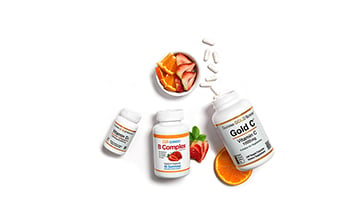Personalized Vitamin Packs: A Doctor Weighs The Pros and Cons

Personalized vitamins come in packs that say they’re tailored just for you. That sounds amazing, right? A personalized list of supplements just for you? Yes, please.
Sure, in theory, that sounds great. But the truth is there’s quite a bit of nuance to choosing supplements. And while they’re called “personalized” vitamin packs, they may not be as individualized as you might hope.
Let’s dive into the world of personalized vitamin packs to sort out the pros and cons of this wellness trend so you can decide if they are right for you!
How Personalized Are They?
Most personalized vitamin companies have you take an online quiz that asks about your general eating habits, stress levels, and some significant concerns (like PMS, fatigue, mood swings, etc.). Based on your answers, an algorithm produces a list of supplements your body might need.
But here’s the catch—does an algorithm know what’s going on in your body? Especially when it only takes into consideration your answers to a five-minute quiz?
While this may work for some things, when it comes to vitamins, nutrients, and herbs, making personalized recommendations is a lot more complicated than just plugging in a list of symptoms and spitting out a list of supplements.
I’ve taken several of these online quizzes to see what they’re about. One question typically asked is whether you are experiencing hair loss or thinning hair—a major and very common complaint among men and women these days.
But guess what? There are SEVERAL reasons why you may be losing hair. Is it due to an underlying condition, like PCOS? Is it due to insulin resistance or stress or anemia? Is it due to a thyroid condition or an autoimmune condition?
And these are just some of the considerations for the one symptom of hair loss. More than likely, you may have other issues going on if you’re looking for a personalized pack of vitamins.
Nutrient Needs Vary
We are all individuals. What’s going on with your best friend who has PMS symptoms is not the same as what’s happening in your body.
You are different people with different metabolisms, different stressors, and different environments. You shouldn’t be taking the same supplements and expecting the same results as someone else just because some of your symptoms are the same.
Many factors affect a person’s nutrient requirements, including age, gender, activity level, stress, nutrition, liver metabolism, hormones, environmental influences, and many others.
If you’re a reproductive-aged woman with a heavy period, you will require a lot more iron than a woman with a light period.2 So you would need a multi-vitamin with higher iron content or an iron supplement on its own.
If you’re trying to conceive or improve your fertility, if you’re postpartum, breastfeeding, or menopausal, these factors can dramatically change your body’s nutrient needs.3,4 Typically in the prenatal, breastfeeding, and postpartum periods, higher amounts of DHA and other omega-3 fatty acids are especially important for fetal neurological development and maternal emotional health.
People with autoimmune conditions often require anti-inflammatory herbs or supplements, like curcumin, Boswellia, or fish oil, to help support a balanced, healthy immune system.
It seems we have algorithms and technology for everything these days, from turning on our lights to finding our parked cars to keeping our coffee warm. But an algorithm can’t do what a trained professional specializes in doing—especially when it comes to vitamins.
You Are What You Absorb
The saying “You are what you eat” should read, “You are what you absorb.” After all, the amount of a nutrient you get from a food or supplement doesn’t only depend on how much of it you take—what matters is how much is absorbed by your gut.
How much you absorb of the nutrients you consume and how you metabolize them largely depends on your gut's health. Everyone’s gut health is vastly different.1 Not only are our guts individual but our gut health and microbiome can change over time.
You may be eating well and taking a range of supplements every day—but if your gut isn’t balanced you may not be absorbing the nutrients you really need from these foods and supplements.
If you have gut issues, you need to address your overall gut health so you can absorb the nutrients you’re eating, and the vitamins you’re taking. Digestive enzymes, digestive bitters, or demulcent herbs, like marshmallow root and slippery elm, may all be beneficial, but depending on your symptoms, one may be more beneficial than another. This is something a naturopathic physician or registered dietitian can help you with—and, likewise, something likely ignored by a personalized vitamin pack algorithm.
Personalized Follow-up
No supplement routine should be forever. It’s important to revisit your overall health, nutrient status, and symptoms every few months and consider if what you’re taking is necessary or overkill. In some cases—especially with fat-soluble vitamins that accumulate in the body when you take more than you need—you may need to retest your levels from time to time and adjust supplement dosage accordingly.
I see so many patients who self-prescribe several different supplements with a “the more the merrier” approach. For your gut absorption and liver metabolism, too much can definitely be a bad thing.
Your liver processes anything and everything that goes through your body. Even too many supplements can have a negative impact.
It’s important only to take supplements your body really needs. For this reason, working with a practitioner is important when creating and monitoring a supplement regimen.
Quality Is Key
Quality is one of the biggest factors I consider when looking at a supplement. The FDA regulates dietary supplements under a different set of regulations than those covering other foods and pharmaceuticals. The FDA is not authorized to assess the safety or effectiveness of supplements on the market, so it’s important to do some of your own research into the quality of a supplement before ingesting it.
Here are the most important questions to ask when choosing a brand of supplements:
Is It Third-Party Tested?
Third-party quality testing is conducted by an organization separate from the company producing the supplements. Any company can test their own products and claim they work. So, third-party testing is essential to ensure you are getting what the package says you are getting and that the ingredients are high-quality.
Does It Use a “Proprietary” Blend?
If so, they don’t have to disclose the dosing or amounts for the herbs used. Many companies will do this because they created a blend they don’t want other companies to use. But in doing so, you, as a consumer, have no idea how much of each component is in that product. The supplement may include only a tiny amount of one of the herbs listed in the blend in a dose that is not of any therapeutic benefit.
For example, vitex is a common herb included in many PMS blends. Vitex can either lower or raise prolactin levels, depending on the dose it’s given at.5 A lower dose can increase your prolactin levels. So, a dose that’s not high enough may negatively interfere with your periods.
For these reasons, I tend to stay away from proprietary blends.
Is It USP Verified?
The United States Pharmacopeia (USP) is a scientific, nonprofit organization that sets quality standards for medications, foods, and supplements.
The USP verification ensures:
- What’s listed in the product is actually in it, in the quantities claimed: You don’t want to buy a product advertising a certain potency that doesn’t live up to its claims. If the quantity of herbs or nutrients is lower than advertised, you won’t see any benefits. Vice versa, if the quantity is higher than advertised, it may be doing harm if you take too much.
- There are no harmful levels of contaminants found in the product: Heavy metals, pesticides, pathogens, and other environmental toxins are everywhere—and they can even be in supplements.
- The supplement will break down and be available to your body in a specified time: If the supplement takes too long to break down, you won’t be able to absorb it and won’t see any benefits.
- The product was made according to FDA standards and uses good manufacturing practices (GMP): It’s important to know the supplement was manufactured in a safe, well-controlled, and sanitary environment.
Does It Include Methylated Forms of B Vitamins?
So many of us—up to 60% of the US population—have methylation issues with our MTHFR gene. The MTHFR gene codes for an enzyme called methylenetetrahydrofolate reductase.6 This enzyme helps convert folate and vitamin B12 into more bioavailable forms your body can readily use.
For this reason, it’s important to use supplements that include methylated forms of B vitamins. For example, if you’re taking a prenatal, ensure it contains methylated folate, NOT folic acid. Folate is critical for proper neural tube (the early brain) formation in your growing baby.
Does the Brand Conduct Research on the Most Effective Dosing for a Particular Herb?
If a supplement is marketed for a specific issue, it’s important to know the dosage included is research-based and the most effective amount for that specific health concern. For example, inositol is a popular supplement for polycystic ovary syndrome (PCOS) and fertility issues.7 Unfortunately, many supplement companies do not include the correct dosage of inositol in their products according to current research on the most effective dosing.
Benefits of Personalized Vitamin Packs
While it’s always ideal to have a more tailored approach to your healthcare and supplement routine, a personalized vitamin pack might be a good fit for you if you're a healthy individual without too many concerns. Here are some of the reasons why you might choose a personalized vitamin pack:
- They’re Convenient: Having supplements that meet your needs sent to your door is super easy and checks one more item off your list without you having to think about it.
- Easy to Take Anywhere. Because they come in individual packages, it’s nice just to throw some in your bags, keep them at your office, in your home, etc., and stick to your routine. For many of us, being consistent with our supplements is the most challenging part—personalized vitamin packs can make it much easier to stay on top of your routine. However, it is important to note that there would be more single-use waste from packaging, meaning this may not the most environmentally friendly option.
Takeaway
Whether personalized vitamin packs are right for you largely depends on your individual situation and your health needs. There are benefits and downsides to anything, and personalized vitamin packs are no exception. While they are convenient, personalized vitamin packs may not be as truly individualized to your needs as you might hope.
As long as you understand what they can do and what they can’t, personalized vitamin packs can be a convenient option. However, it is always best to work with a qualified professional who can truly tailor your supplement regimen to your individual health needs.
References:
- Thursby E, Juge N. Introduction to the human gut microbiota. Biochem J. 2017;474(11):1823-1836. Published 2017 May 16. doi:10.1042/BCJ20160510
- Silvestris E, Lovero D, Palmirotta R. Nutrition and Female Fertility: An Interdependent Correlation. Front Endocrinol (Lausanne). 2019;10:346. Published 2019 Jun 7. doi:10.3389/fendo.2019.00346
- Bzikowska A, Czerwonogrodzka-Senczyna A, Wesołowska A, Weker H. Nutrition during breastfeeding - impact on human milk composition. Pol Merkur Lekarski. 2017 Dec 22;43(258):276-280. PMID: 29298968.
- Silva TR, Oppermann K, Reis FM, Spritzer PM. Nutrition in Menopausal Women: A Narrative Review. Nutrients. 2021 Jun 23;13(7):2149. doi: 10.3390/nu13072149. PMID: 34201460; PMCID: PMC8308420.
- Shaw S, Wyatt K, Campbell J, Ernst E, Thompson‐Coon J. Vitex agnus castus for premenstrual syndrome. Cochrane Database Syst Rev. 2018;2018(3):CD004632. Published 2018 Mar 2. doi:10.1002/14651858.CD004632.pub2
- Leclerc D, Sibani S, Rozen R. Molecular Biology of Methylenetetrahydrofolate Reductase (MTHFR) and Overview of Mutations/Polymorphisms. In: Madame Curie Bioscience Database [Internet]. Austin (TX): Landes Bioscience; 2000-2013. Available from: https://www.ncbi.nlm.nih.gov/books/NBK6561/
- Unfer V, Facchinetti F, Orrù B, Giordani B, Nestler J. Myo-inositol effects in women with PCOS: a meta-analysis of randomized controlled trials. Endocr Connect. 2017;6(8):647-658. doi:10.1530/EC-17-0243
DISCLAIMER:This Wellness Hub does not intend to provide diagnosis...

















































































 Table of Contents
Table of Contents











